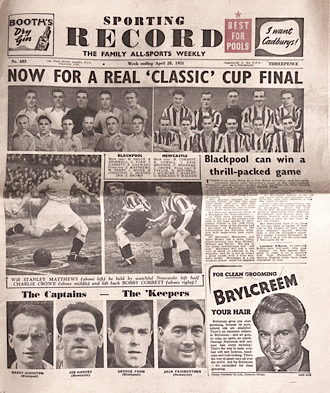
As the players trooped into the Leeds Road dressing room after the Semi-Final replay a delighted Seymour announced that they could all relax because their Cup Final place was secure.
Good news for the players, but not necessarily the best motivation for a group of players who were fourth in the table and had eleven games to play in the six weeks before the Final.
As a result, United, who had won three of their last four League matches and were unbeaten since mid January, would only win one (drawing five and losing five) of those intervening games. The players took their eye off the ball and the team play was disrupted as players were rested for "minor niggles".
Blackpool, who had been a couple of points behind United at the Semi-Final stage ended up four points and three places to the better by the time the Final arrived.
Consequently, the Tangerines were regarded as the favourites and also had the sympathy vote because the nation's most popular player, Matthews, was, at 36, still looking for that elusive cup medal.
The teams met in the League in mid-March and despite poor playing conditions and the absence of a number of "stars" they played out an entertaining 2-2 draw. Hopes were high for an exciting final.
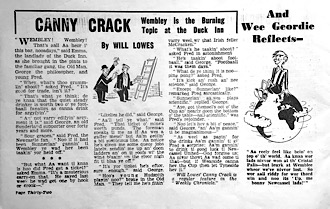
Each finalist received 12,500 tickets in total. Of these 5,000 went to season ticket holders and about 1,500 to players, officials and others leaving between 5-6,000 for general sale.
A total of 115,000 fans made applications for the remaining tickets. The applications went into "the hat" with the draw being made by secretary Ted Hall and his assistant Mr H Barker. They had no less than 23 mailbags to choose from and the exercise took them from 10.00am until late in the afternoon. The luckiest fan was 42-year-old Jack Patterson, an Ashington colliery deputy, who was drawn out last.
Just after the semi-final victory, seven miners who had been trapped for thirty-four hours at South Birtley pit were finally released. The club gave them tickets for the Final.
Joe Harvey's indomitable wife Ida wasn't impressed when she discovered that the players' wives had been furnished with stand, rather than seat, tickets. Husband Joe was ordered to get it sorted which he did.
Not surprisingly tickets were like gold dust. Even before the Quarter Finals there were rumours flying around that touts were selling Cup Final tickets on Tyneside. The FA treated the reports with scepticism, but advised people not to buy them as they must be forgeries.
London Spivs arrived in the area in late March despite the fact that Newcastle had not yet received their ticket allocation. They were in public houses in the Seaton Valley area trying to sell 7s 6d tickets for up to £2 10s. They were chased out of some hostelries.
On Cup Final day ticket touts were, for the first time, banned from roads around Wembley, but they were out in force at Wembley main line station. Nylons and whiskey were among the temptations,
It was reported that some spivs were making profits of between 1,500 and 2,800 percent. One 10s 6d ticket went for £12 and several 3s tickets went for £4 4s each.
Fusilier John Hulme (from Shiremoor) won a service man's raffle organised by the Newcastle Journal and Chronicle. He was called from a Bren Gun pit to be told his name had been drawn from the hat to be a guest of the Newcastle Journal and Chronicle at Wembley. He was flown home from the Korean battlefront to sit alongside Alderman McKeag as his special guest for the day.
United had planned to raffle twelve tickets at a "Here's to Wembley Victory Dance" with each ticket being presented by one of the Final team with trainer Norman Smith presenting the other. However the Chief Constable of Newcastle declared that the proposed ticket raffle was illegal. Milburn revealed that the tickets would be given as prizes for "spot dances" instead.
Another raffle was stopped by police (as a contravention of the ticket allocation rules) when it was found that the tickets on offer had been donated by a Labour MP who had been promised them by United Director Lord Westwood.
A Newcastle factory worker raffled his ticket at 1s-a-time and got £13 for it. When he decided to change his mind the unlucky winner stated (reportedly): "All right, I'm not fussy" and gave it back to him.
Fans without tickets were offering all sorts of things including a live pig (worth £30), six blankets (worth £8 a pair) for two stand tickets, a ton of coal and a set of car tyres. Three shilling tickets were fetching up to £5 each and 7sh 6d tickets were being offered at £14 at one Newcastle club.
On Friday evening, twenty-four trains bound for London started to set off at 9.25pm. Trains left at twenty minute intervals and despite the huge numbers of fans travelling the event was organised well and remarkably orderly.
The 10 O'Clock had a coach housing the director’s party and it was decorated with the team’s colours and cartoons drawn by British Rail staff. The last train set off at 1.50am on Saturday morning.
Lots of motor-coaches also made the journey South too.
Fifty-three lucky passengers avoided the crush by flying in a Dakota and three Dragon-Rapide aircraft from Newcastle Municipal Airport at Woolsington.
The North of England Home Service broadcast a special Cup Final edition of the popular Tyneside programme "Wot Cheor, Geordie" hosted by Esther McCracken. Special guests include Stan Mortenson and Jack Fairbrother and the Dunelm Singers performed that old favourite of the Tyneside music hall "the futbaal team”.
Before the match the rival supporters paraded around London singing, chanting and rattling their rattles. Some United supporters carried mechanical magpies.
Inside the ground the rival supporters sang their anthems: "Blaydon Races" and "Lassie from Lancashire".
Owners of television sets in the North east were hoping that "freak" reception would allow them to see pictures of the match.
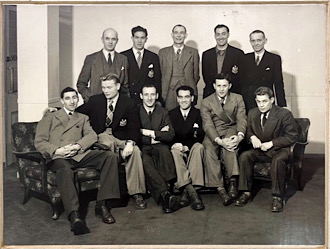
The players were only on £12 for the Final and their humour was not helped by former player Len Shackleton's suggestion that they refuse to play. The players even discussed it, but agreed that nothing could be done. Charlie Crowe later found out that the band members of the Coldstream Guards got a bigger payday.
The FA wanted the Finalists to look elegant and in keeping with the occasion they made a sartorial request for both keepers to leave their cloth caps at home. As an alternative, they suggested a peaked sports cap like those that baseball players wore.
Fairbrother was not happy with the baseball cap idea because he believed it would restrict his view, particularly with crosses. Norman Smith said: "to my mind a goalkeeper playing with an extended peaked cap is definitely a danger to other players". And Seymour moaned "we're not going to Wembley as comedians". They also suggest that Newcastle should wear all-black stockings to which secretary Hall states "do they want us to go to the Final in mourning?"
Before United left for their training camp they went to the Haymarket Cinema to watch footage of the 1949 Final where Blackpool were beaten by Manchester United and of Blackpool's games on the way to Wembley. Captain Harvey proclaimed it a "useful insight".
Stan Seymour was a great believer in his special "training camps" and the United party spent Cup Final week in Buxton. It was a great and crucial decision. The team spirit that was already a major feature of the side was further strengthened as the United players mixed training with pleasure. The players also enjoyed the extra £2 a day spending money they received when away from home.
Ten players and reserve (Bob Stokoe) set off for Buxton after a quiet send-off. There is a shout from one of the private compartments; "We will bring the Cup back all right”. Jack Fairbrother travelled a day later as he had a long standing private engagement. Seymour planned to have several tea-time tactical talks and assured everyone that: "You will see the Newcastle who knocked out Wolves in the semi-final. That is the true Newcastle form".
During the week the famous "lucky penny" arrived by registered post. It had belonged to the late secretary Mr FG Watt who usually always carried it in his belt; though Neil Harris had it in his pocket when his goal helped United win the cup in 1924. The Victorian coinage had been sent to Watt by a zealous supporter who believed that it had brought him great fortune.
On Wednesday United have a two-hour training session on Buxton Town’s pitch. They are on a prescription of sherry and eggs and in the afternoon the players partake in aluminium brine baths and a massage. The players send a telegram to Blackpool player Brown who has been ruled out of the big game.
Bobby Cowell and Ernie Taylor nearly got themselves sent home after breaking curfew. Seymour caught them red-handed arriving back and said they would be dropped, but thankfully changed his mind after sleeping on it.
On the Thursday evening the players relaxed with a singalong and it was reported that Joe Harvey and Stan Seymour almost brought the house down (literally) with their singing competition.
Newcastle left Buxton on Friday at 9.00am and they were seen off by the Major to a fanfare of trumpets. They picked up the London train at Millers Dale. Newcastle had applied to go to the King's Head hotel in Harrow (as it was seen as a lucky hotel) but Blackpool had got there first. Players and officials visited Wembley on their way to Weybridge.
Weybridge was where the Scotland team stayed when they beat England at Wembley earlier that season. When Seymour was asked what the mood was in the camp he said "serene"; there was a quiet confidence and spirit about the side that was going to prove hard to beat.
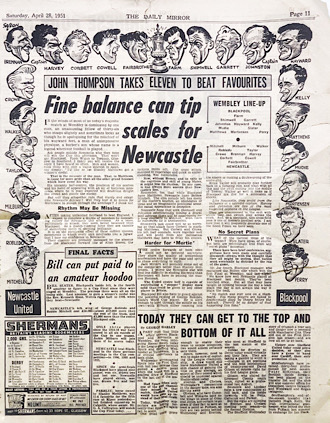
The United team was, as Seymour had promised, unchanged: Fairbrother, Cowell, Corbett, Harvey, Brennan, Crowe, Walker, Taylor, Milburn, Robledo G, Mitchell.
Pictures and penpics here: NUFC 1951 Cup Final Team
Blackpool were unfortunate to have lost the services of Scottish international Alan Brown; this was a major blow to the Seasiders.
Goalkeeper was Scottish international George Farm who was noted for his unconventional method of catching the ball (top and bottom and not left and right).
Rugged England international Shimwell and Horden born Garrett were the full backs.
The half-back line was Johnstone (captain and Footballer of the Year), (the veteran) Hayward and (former miner) Kelly.
Up front they had Matthews (the incomparable), Mudie (hard working with an eye for goals), Mortenson (top scorer from South Shields), Slater (an amatuer international with only a few appearances behind him) and Perry.
Six of the team had appeared in the 1948 Cup Final: Matthews, Mortenson, Johnstone, Shimwell, Hayward and Kelly and the former three had just played for England against Scotland.
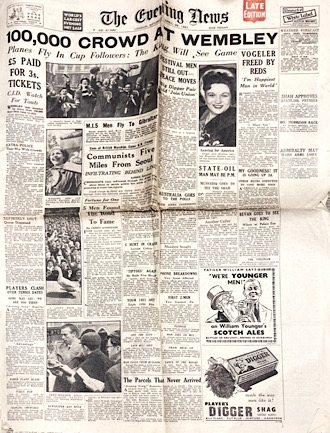
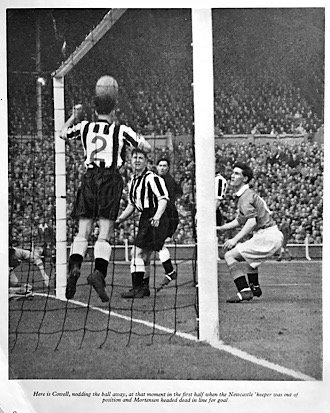
As the players came out Charlie Crowe turned to Jack Mudie and wished him the best of luck; there was no reply and the look on his face convinced Charlie that the Blackpool players were far more tense than the relatively relaxed Newcastle team. Indeed Charlie was not nervous in the slightest.
Joe Harvey won the toss. As the game kicked off it was a perfect spring afternoon; there was a slight breeze which was behind the Magpies. It started brightly and Blackpool had a couple of efforts on goal before United broke at lightning pace and Milburn shot past Farm (9 minutes) only to be penalised for handball. "Oh, oh what a referee" sang the United fans to referee Bill Ling.
After that the game degenerated, with Blackpool pushing their full backs up to form a line with Hayward so they could move up quickly and catch United offside. Nine times in all Blackpool sprung the offside trap as the United fans became increasingly frustrated. With play compressed possession was often surrendered and the ball ended up out of play with monotonous regularity
Blackpool had a couple of near misses at the other end; Mudie wasting one opportunity and Cowell heading a Mortenson effort off the line (20 minutes); a defining moment which was captured for posterity by the camera lens.
Defences were certainly on top. Only Milburn and occasionally Taylor were in the game for United whilst Matthews, at his mesmerising best, and Johnstone were the only players causing United's rearguard any problems. Their best chance fell to Slater who wasted the opportunity.
On the half hour Milburn beat the Blackpool trap and only a headlong dive by the Blackpool custodian stopped him scoring; it was a warning that the Tangerines did not heed.
At half-time the players discussed the tactics for the second period with Seymour and Smith and they decided that their best chance of defeating the Blackpool offside trap was to make early and long passes. It was a good call.
With barely five minutes gone a Blackpool attack broke down as a Matthews cross ran behind the onrushing Mortenson. Robledo intercepted and immediately played it long to Milburn who was just inside the opposition half. The Blackpool players looked to the linesman but his flag was down.
Jackie takes up the story himself in his autobiography "Golden Goals". "I found a wide open space between me and goalkeeper George Farm, who looked so far away I assumed he might well be on his own front garden in Blackpool".
”Then followed the longest run I've ever experienced with a football at my feet. It seemed to take hours for me to reach the eighteen yards, and all the time I felt as if the world was on my heels. I was wearing my heavy boots, with a thick sole, so that I could really put some punch into my shots, but as I approached Farm, who was now bobbing up and down like a jack-in-the-box for a second I forgot all about the crowd, the defenders on my heels, and the King watching in the Royal Box. Two questions had to be answered quickly. Should I have a crack at goal and hope for the best? Or should I try to place the ball past goalkeeper Farm.”
”I did not have to make my own decision. On the eighteen yards line I noticed Farm had left a little more space on his right hand. It wasn't much - but it was enough for a forward to decide which was the bigger target. So taking a big chance, for George Farm's an agile fellow with tremendous reaction, I made up my mind to glide the ball past him. As the ball left my foot for one dreadful moment I feared I hadn't hot it hard enough - but the roar of the crowd told me I was wrong.
Local Reporter Sidney Sterck joined the "three-bob-enders" at Wembley and described how "Geordie's Roar Tore The Clouds To Shreds". There was an "atom bomb like roar" as fans "leapt madly in the air with a frantic waving of arms".
Now the fans added a new line to their referee's song..... "and his little wooden whistle wouldn't whistle".
Four minutes later, Milburn doubled the lead with one of the best goals ever seen at Wembley. This time Milburn had no time to dwell on the possibilities. Walker beat a couple of defenders down the right and passed inside to Taylor. Milburn screamed to him to back-heel, but there was a moments hesitation before he duly obliged.
Milburn was further over the ball than he wished to be and got underneath the ball when he struck it. The result was a ferocious, rising, left-footed shot into the top right-hand corner. Many players and critics described it as the best goal ever seen at Wembley.
Sidney Sterck continued "the Geordies seemed to want to jump right into heaven. The spectacle was a study of mass delirium, a black and white sketch of mass hysteria in its most nerve shattering form."
Blackpool gamely fought back with Matthews taking on more and more himself in a desperate attempt to get the Seasiders back into the match. But with Brennan brilliantly blotting out Mortenson, Harvey coping easily with Slater and Corbett and Crowe working tirelessly to counter the mercurial Matthews, they made little headway.
Indeed Milburn could easily have scored a third when he broke through again, but delayed his shot too long allowing Farm to smother it.
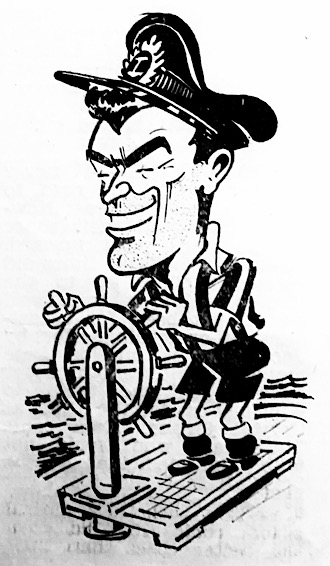
"We were resolved to a man that Blackpool would not beat us. As captain of the side I knew what this spirit really meant and that Blackpool would have to be a super-team to deprive us of the honour of winning the Cup.”
"I found that her majesty really enjoyed the football with quite a knowledge of the game. At two or three stages she passed comments concerning offsides and other decisions."
Prior to the final the police enjoyed a screening of the 1932 FA Cup Final celebrations. The chief constable stated that the crowd chaos "astounded" some of the younger officers.
On Saturday night, the team enjoyed a reception at The Savoy. Many fans waited outside until the early hours hoping to get a glimpse of their heroes.
Prior to returning home United had an away fixture to fulfil at Molineux and the Cup was paraded around the ground at half-time.The Newcastle party finally returned on Thursday and the train had a huge circular placard on the front which stated "It's Wors Again" 1910,1924,1932,1951. The train stopped off for five minutes at Sunderland station to allow fans to show their appreciation.
An estimated 200,000 turned out in Newcastle (double what the police had estimated for). A reserve fixture took place at St. James’ to try and relieve the congestion within the city centre and as a result drew a crowd of over 60,000.
Three coaches took players and officials from Central Station to St. James' via Neville Street, Collingwood Street, Moseley Street, Grey Street, Blackett Street and Gallowgate. Twice the parade had to halt due to the crowds breaking through the police cordon. Then there was a parade around the ground.
A celebration dance was held at the Oxford Galleries for the players and their wives and there were rumours amongst the players that the wives would be presented with handbags full of cash. Illegal payments were rife at the time, but at Newcastle there had usually been very little on offer.
In the end they were to be disappointed as the handbags were full of old newspapers.
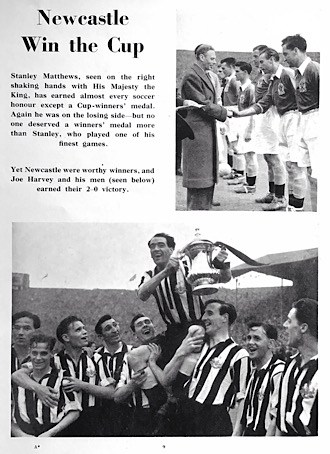
There are a number of reasons why Newcastle deservedly won on the day:
Newcastle's team spirit was second to none.
Newcastle played more effectively as a team and put in a more workmanlike performance.
Newcastle’s players won their individual battles with their direct counterparts.
Milburn's speed and finishing power.
Blackpools over reliance on offside tactics.
The injury to Alan Brown and the lack of a suitable replacement.
Newcastle's ability to score goals in quick succession.
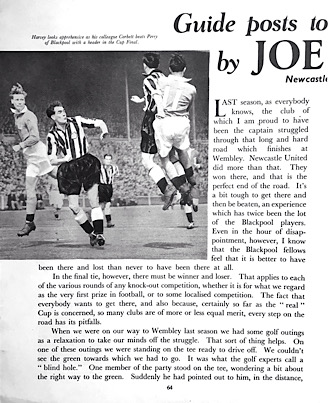
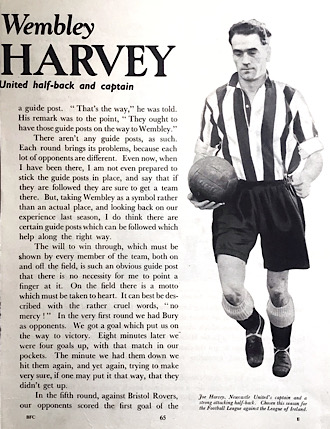
In an article later that year Joe Harvey outlined some of the (timeless) factors he believed were most important in United's successful cup run.
"The will to win through, which must be shown by every member of the team, both on and off the field. On the field there is a motto which must be taken to heart.... "no mercy!"
"Hit them once. And instead of running round the field shaking hands and doing fancy dances of rejoicing, roll the sleeves a little higher and set about the business of hitting them again.”
”We had a centre-forward in Jackie Milburn who is a prime goal-getter, and it was part of our tactics to see that he got the chances to shoot those goals.”
”Playing to the whistle. Concerning at least three of our very important goals there was what the critics called a shadow of doubt .... it isn't the time to hesitate. Play on. So long as the whistle hasn't sounded keep on and bang the ball into the net."